John Wycliffe - Trinitarian Bible Society
John Wycliffe - Trinitarian Bible Society
John Wycliffe - Trinitarian Bible Society
Create successful ePaper yourself
Turn your PDF publications into a flip-book with our unique Google optimized e-Paper software.
<strong>Trinitarian</strong> <strong>Bible</strong> <strong>Society</strong> – Quarterly Record<br />
We use the word Inspiration to describe that process: the breath of God, God the Holy<br />
Spirit coming upon specially prepared and chosen men. In 2 Peter 1.21 it says He acted through<br />
these men to write His Word, not by the will of man: ‘but holy men of God spake as they were<br />
moved by the Holy Ghost’. It should never cease to amaze us, the marvel and the miracle of the<br />
way that God the Holy Spirit worked through these men, causing them to write down the very<br />
words He wanted them to write just as surely as if their writing implements were in His own<br />
hand, ‘not in the words which man’s wisdom teacheth, but which the Holy Ghost teacheth’<br />
(1 Corinthians 2.13). It was the Lord revealing and dictating His Truth and the men writing it<br />
down according to their individual writing styles.<br />
This was not a mechanical thing, it was an organic thing. The Lord directed them to write<br />
exactly what He wanted them to write and yet they were free enough to express this God-given<br />
truth in their own particular and individual styles. We read, for instance, that ‘the Holy Ghost<br />
by the mouth of David spake’ (Acts 1.16), and yet David said the words. Thus you see that God<br />
was the writer in effect and yet David was the one who expressed it in his own form, different<br />
from the writing styles of the other authors of the <strong>Bible</strong>, and this produced Scripture. Such a<br />
marvellous, seamless interface between the Sovereign work of God and the very real work of<br />
His chosen penmen produced Scripture. It was not simply that the men were inspired, but their<br />
writings were inspired. Thus Scripture is Divine and Divinely-authoritative. So God wrote the<br />
<strong>Bible</strong>, the Scriptures.<br />
Let’s see one further thing here. God gave the entire <strong>Bible</strong>: all Scripture. Now it could be<br />
argued that all this verse means is the entire Old Testament because, if you go back to verse 15,<br />
Paul reminds Timothy ‘that from a child thou hast known the holy scriptures, which are able to<br />
make thee wise unto salvation through faith which is in Christ Jesus’. It is very likely that this<br />
refers to the Old Testament Scriptures that were part of Timothy’s nurturing. Therefore, some<br />
say Paul cannot be referring to the New Testament as well when he says ‘all scripture’.<br />
An answer to this was pointed out by B. B. Warfield. It is not the extent of Scripture in verse<br />
16 that is being referred to, but the nature of Scripture. We have seen that Scripture has God for<br />
its Originator and God for the One who instrumentally wrote it down. If the New Testament<br />
could be termed ‘Scripture’, then it would qualify to be included in this ‘all scripture... given by<br />
inspiration of God’. As a matter of fact, the New Testament is called Scripture in this sense. If<br />
you turn to 1 Timothy 5.18, you find Paul writing to his young friend concerning the material<br />
support of the elders in the churches; ‘for the scripture saith, Thou shalt not muzzle the ox that<br />
treadeth out the corn. And, The labourer is worthy of his reward’. Both these are called<br />
‘Scripture’. The first, ‘thou shalt not muzzle the ox that treadeth out the corn’, is from<br />
Deuteronomy 25.4. But when he goes on to say that ‘the labourer is worthy of his reward’, he is<br />
quoting our Lord’s words from Luke 10.7 in the New Testament. So, as far as Paul is concerned,<br />
the New Testament qualifies as being Scripture as surely as the Old Testament.<br />
Another passage is 2 Peter 3.16. Here Peter refers to the Apostle Paul’s letters: ‘As also in all<br />
his epistles, speaking in them of these things; in which are some things hard to be understood,<br />
10<br />
Issue Number: 565 – October to December<br />
which they that are unlearned and unstable wrest, as they do also the other scriptures, unto<br />
their own destruction’. Peter sees Paul’s writings as ‘Scripture’ along with the Old Testament. It<br />
seems quite clear that when the Apostle writes ‘all scripture’, he is including the emerging New<br />
Testament in that term; in fact, most of the New Testament Scriptures were written by this<br />
time. So God gave the entire <strong>Bible</strong>.<br />
Putting these things together, we have no reason to rationalise and try to explain how it<br />
was that God actually brought the Scriptures into being through human penmen. Neither do<br />
we have anything to do with degrees of inspiration, to suggest that the writers were inspired but<br />
the actual Scriptures they produced were not. ‘All scripture is given by inspiration of God’: we<br />
believe in the <strong>Bible</strong>’s own doctrine of inspiration: verbal, every word, plenary, full and complete.<br />
It is as Dean Burgon once said,<br />
‘The <strong>Bible</strong> is none other than the voice of Him that sitteth upon the throne. Every<br />
book of it, every chapter of it, every verse of it, every word of it, every syllable of it,<br />
every letter of it is the direct utterance of the Most High…The <strong>Bible</strong> is none other<br />
than the Word of God. There is not some part of it that is more, some part of it less,<br />
inspired, but all are alike the utterance of Him who sitteth upon the throne: absolute,<br />
faultless, unerring, supreme.’<br />
Thank God for the origin of this <strong>Bible</strong>! We trace it up to Him Who is in heaven, the God of Truth<br />
who has given the Word of Truth.<br />
The Benefit of the <strong>Bible</strong><br />
Let us look secondly at the <strong>Bible</strong>’s benefit: ‘and is profitable for doctrine, for reproof, for<br />
correction, for instruction in righteousness’. Now God has given us His Word to do us<br />
good. Here is the truth of the inspiration and authority of Scripture applied to us, and<br />
woe betide us if we only hold this as a doctrine. Woe betide us if we only support the <strong>Trinitarian</strong><br />
<strong>Bible</strong> <strong>Society</strong> because it circulates our favourite <strong>Bible</strong> version and little more. God in giving us<br />
His Word intends that what we believe about this Word is applied to our hearts and applied to<br />
our lives, and that it transforms us by the renewing of our minds to prove that good and acceptable<br />
and perfect will of God (Romans 12.2).<br />
Let us see now something of the application. The <strong>Bible</strong> is ‘profitable for doctrine’. The<br />
essence of the Reformation, the essence of Protestantism, is teaching, and teaching from one<br />
source, the Scripture of Truth. Real religion is knowing and feeling the things that are in Holy<br />
Writ. Rabbi Duncan said that the <strong>Bible</strong> is the great medium through which we know God on<br />
earth. As we grow in grace as Christians we find that the teachings of the <strong>Bible</strong>, all the various<br />
doctrines in it, are almost like piecing together the parts of a jigsaw puzzle. We commence the<br />
Christian life and experience knowing a little, and as we grow, more pieces are fitted in and we<br />
have fuller, clearer views of truth. Before long the scheme of things becomes clearer and clear-<br />
11



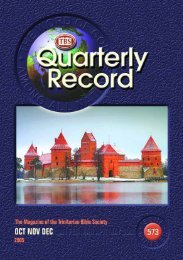
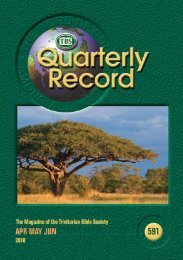
![The Love of the Truth [pdf] - Trinitarian Bible Society](https://img.yumpu.com/49788277/1/184x260/the-love-of-the-truth-pdf-trinitarian-bible-society.jpg?quality=85)
![Bible Word List and Reading Plan [pdf] - Trinitarian Bible Society](https://img.yumpu.com/46882563/1/177x260/bible-word-list-and-reading-plan-pdf-trinitarian-bible-society.jpg?quality=85)
![Click to Download Document [pdf] - Trinitarian Bible Society](https://img.yumpu.com/44904205/1/184x260/click-to-download-document-pdf-trinitarian-bible-society.jpg?quality=85)
![Download Document [pdf] - Trinitarian Bible Society](https://img.yumpu.com/44584740/1/184x260/download-document-pdf-trinitarian-bible-society.jpg?quality=85)
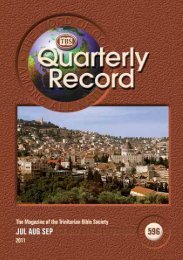
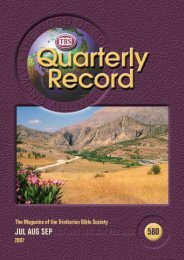
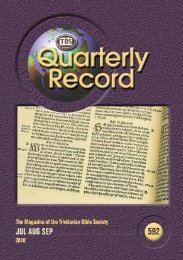
![Download Document [pdf] - Trinitarian Bible Society](https://img.yumpu.com/41007786/1/184x260/download-document-pdf-trinitarian-bible-society.jpg?quality=85)
![Click to Download Document [pdf] - Trinitarian Bible Society](https://img.yumpu.com/40894484/1/188x260/click-to-download-document-pdf-trinitarian-bible-society.jpg?quality=85)
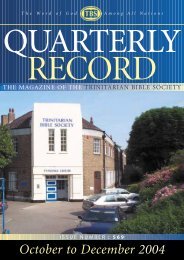
![Download Document [pdf] - Trinitarian Bible Society](https://img.yumpu.com/39425868/1/184x260/download-document-pdf-trinitarian-bible-society.jpg?quality=85)
![Download Document [pdf] - Trinitarian Bible Society](https://img.yumpu.com/39425821/1/184x260/download-document-pdf-trinitarian-bible-society.jpg?quality=85)